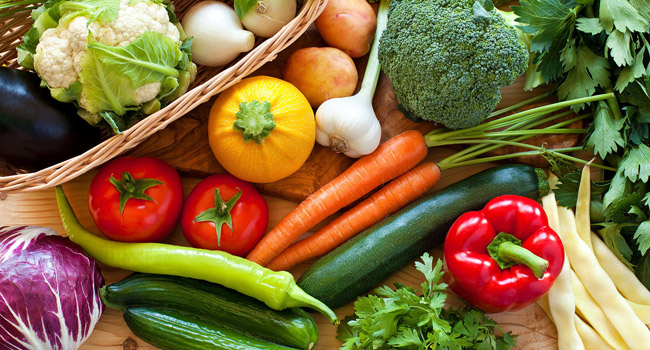
Nutrition and Health: Separating the Fact from the Fiction
By Erin Sisson, BSN, RN, RD, LD, CDE
When it comes to nutrition and health, separating fact from fiction can be very difficult! Misinformation, half-truths, and health claims that are not backed by scientific evidence, flood the internet and mainstream media. While some claims may not be explicitly harmful, they may create false hopes that can deter many from pursuing a healthy lifestyle. In a recent talk I gave at World Peace Yoga, Cincinnati… in an attempt to clear the noise, I debunked the top ten myths I hear on a daily basis from patients I work with, family, and friends. Included here are a few of the more popular myths I discussed in the talk. Additionally, I have included some resources to help you on your journey to living and sustaining a healthy plant-based lifestyle.
Myth #1: If a food is cholesterol-free, it is heart-healthy.
This statement is partly true. Cholesterol is linked to increased risk for heart disease. However, Cholesterol is not the only culprit. Saturated fats and trans fats also increase risk for heart disease and actually have a greater impact on blood cholesterol than dietary cholesterol. There is significant evidence that replacing saturated fat with polyunsaturated fat can significantly reduce your cardiovascular disease risk. Vegans consume no cholesterol (as cholesterol is only found in animal-derived foods) and have the lowest saturated fat intake of all dietary groups. Vegan sources of saturated fats include fried foods, fast food, coconut oil, and processed foods.
Myth #2: Sea Salt is healthier than (iodized) table salt.
Sea salt has gained a lot of press over the past few years as a healthy alternative to traditional table salt. The perceived benefit comes from the way sea salt is processed. Sea salt is processed through evaporation of ocean water or saltwater lakes. This leaves trace mineral behind, such as iron and magnesium. However, the minerals are trace and have very little benefit. Most table salt, however, contains added iodine which is an essential nutrient that helps to maintain healthy thyroid hormone levels. Sea salt does not typically contain iodine unless it is added. Overall, sea salt and table salt have the same nutritional value and the same amount of sodium, by weight. If sea salt or table salt are utilized, its important to make sure that the salt is iodized. Many Sea Salt companies are now adding this important mineral to their products.
However, it is important to not lose sight of the fact that excessive intake of sodium (found in salt) can increase risk for high blood pressure. Up to the age 50, sodium intakes ranging from 1500-2300mg of sodium per day are suggested. Intakes should range from 1300-1500mg from the age 50-70 and 1200-1500mg after the age of 70. Among Americans, most sodium comes from processed foods; only 6% comes from table salt and 5% is added during cooking.
Myth #3: Eating a Paleo diet is natural and good for you.
To start, as a dietitian, I think its important to point out that there are some positive concepts in the “Paleo Diet”: limiting processed foods, dairy, and refined grains. However, some of the limitations of the “Paleo Diet” are that the modern Paleo diet does not accurately reflect what are paleolithic ancestors actually ate! The leaders of the Paleo diet movement assert that our ancestors ate a very meat-heavy, low starch diet. However, as discussed in her Ted Talk, Dr. Christina Warinner, an archeological scientist who studies the health and dietary history of ancient people using bone chemistry and DNA, explains how, rather than hunting, we evolved for starch-rich plants. For a more in-depth look at the modern paleo diet check out my recent discussion about the myths of the Paleo diet on the Live Planted podcast at LivePlanted.com.
Myth #4: Soy is unsafe.
This myth could not be any further from the truth. Soy is a wonderful, health-promoting food. Soy-based foods are rich is in healthy fats, calcium, and isoflavones (phytochemicals) that help to protect the bones and heart. Soy has also been shown to be protective against breast cancer, lower the risk for recurrence, and lower risk for dying of breast cancer. Additionally, populations that eat diets rich in soy foods have lower incidences of prostate and breast cancers, as well as, heart disease. The caveat here is that the best sources of soy come from whole soy foods, such as, soy beans, soy milk, tofu, tempeh, and miso. Highly processed soy products do not have the same protective benefits.
Myth #5: A LOW FAT (<10% total calories) plant-based diet is the best diet for everybody.
There is no question that a low fat, plant-based diet is healthy. Healthcare leaders including, Dr. Neal Barnard, Dr. Dean Ornish, Dr. Caldwell Esselstyn, and Dr. T. Colin Campbell have through their work evidenced the benefit to this diet, especially for patient with diabetes and advanced heart disease. However, there have not been large studies showing that a low fat (<10% of total calories) diet would be ideal for those without diabetes or heart disease. Additionally, many would argue that unless necessary, a diet this low in fat would be difficult to stick with long term.
Numbers aside, we do know that whole foods, such as nuts, seeds, avocados, soy, and olives, are the best sources for fat. Americans would benefit from an overall reduction in refined omega 6-rich vegetable oils (i.e. vegetable, canola, olive, peanut, corn). Additionally, a higher consumption of omega 3-rich fats like walnuts, hemp, chia, and flax help to fight inflammation and lower risk for heart disease and other chronic conditions.
Myth #6: Gluten should be eliminated from the diet.
Gluten has gained a great deal of press over the past decade. More Americans have been diagnosed with Celiac disease and some studies estimate that as high as 1 out of every 100 Americans have celiac disease. As a result there has been a rise in gluten-free products and foods containing gluten are losing their appeal. More people are also reporting “feeling better” after eliminating gluten from the diet. Gluten is found often in heavily processed foods, which may impact why people often feel better after eliminating gluten. However, gluten is also found in healthy fiber-rich, nutrient-dense grains. Additionally, many gluten-free commercially produced foods are seen as healthy, when in fact they may still be just as processed as their gluten-rich counterparts (ex. gluten-free cookies). Bottom line, there are tests for celiac disease (require a doctor’s order) and elimination diets that may help individuals discern whether they are gluten-sensitive. If you find that you do not have a negative response to gluten, try to include more of the gluten-containing whole-foods in your diet and less of the processed stuff.
Myth #7: (Type 2) Diabetes is caused by eating too much carbohydrate/sugar.
As a Diabetes Educator, I here this myth on a daily basis. The reality is that “intramyocellular lipids” (or fat in our cells) create insulin resistance. Insulin resistance prevents the hormone insulin (made in our pancreas) from moving sugar out of our blood stream and into our cells (primarily the muscle cells). This then causes the pancreas to work harder to release more insulin and sugar starts to build up in the blood stream. The blood sugar stays within a reasonable range for a while (pre-diabetes) but then starts to creep up over time as the cells become more and more resistant and the pancreas gets tired of releasing so much insulin. This is Type 2 diabetes.
Dr. Neal Barnard of the Physician’s Committee for Responsible Medicine (PCRM.org) has performed several studies showing the benefit that a low-fat plant-based diet can have on type 2 diabetes prevention and treatment. Many participants in his studies were able to lower or stop taking (under medical supervision) their oral diabetes medications and/or insulin! The study participants were able to treat their diabetes with diet alone! Dr. Barnard’s work is very important and I hope to see more physicians follow suit and promote more diet approaches to treat chronic diseases like type 2 diabetes.
Below are my top 3 resources for getting started on a healthy, plant-based diet. Additionally I’ve included some great podcasts, youtube channels, and books to support you on your journey to better health!
- Physician’s Committee for Responsible Medicine (PCRM.org) PCRM is a great resource, full of research-based health information, tips, and recipes. I use the PCRM “Power Plate” often to educate about how to plan a well-balanced plant-based meal.
- Lighter: www.lighter.world This is probably one of my favorite resources. Lighter is a website that helps users create custom meal plans for free. The meal plans are based on user preferences including goals, food preferences, kitchen appliance, time available to prepare food, and number of people to feed.
- “Becoming Vegan” by Brenda Davis, RD and Vesanto Melina, MS, RD. This a great, detailed, fact-filled resource for anyone transitioning to a plant-base diet. This book answers questions about nutrition requirements for all stages of life (ex. pregnancy, childhood) and specific needs (ex. breastfeeding and athletic performance).
Additional Resources:
“Preventing and Reversing Heart Disease”, Dr. Caldwell Esselstyn, Jr.
“Dr. Neal Barnard’s Program for Reversing Diabetes”, Dr. Neal Barnard
“How Not to Die”, Dr. Michael Greger
“Eat Vegan on $4 a Day” Ellen Jeffe Jones
“Nutrition Facts” youtube channel and NutritionFacts.org Dr. Michael Greger
“That Vegan Mom” youtube channel
“Mic The Vegan” youtube channel
“Rich Roll” Podcast
“Brown Vegan” Podcast
“Main Street Vegan” Podcast
“Live Planted” Podcast
“Our Hen House” Podcast
Join Erin on Sunday, July 16 for her Health is Wealth: Plant-Based Nutrition Made Simple workshop. And make sure to watch the new documentary, What the Health.
